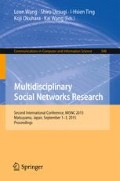Abstract
The concept of network has different meanings in different disciplines. Consider, for instance, social sciences where, mostly, denotes a set of actors or other fields defining the concept as agents, or nodes, or points, or vertices that may have relationships with one another. One of the issues to solve in social network analysis is the problem of ranking the nodes. In this paper, we combine cooperative game theory framework and linear programming techniques and suggest an equivalent alternative model to Shapley value. We present a numerical illustration explaining how our model can be applied in problems related to social networks.
Access this chapter
Tax calculation will be finalised at checkout
Purchases are for personal use only
Preview
Unable to display preview. Download preview PDF.
References
Narayanam, R.: Game Theory Models for Social Networks Analysis. IBM Research (2012). http://www.imsc.res.in/~sitabhra/meetings/socialnetwork0212/talks/Ramasuri_Narayanam_Game_Theoretic_Models_for_Social_Network_Analysis_I.pdf (retrieved March 13, 2015)
Liebowitz, J.: Linking social network analysis with the analytic hierarchy process for knowledge mapping in organizations. Journal of Knowledge Management 9(1), 76–86 (2005)
Izquierdo, L.R., Hanneman, R.A.: Introduction to the Formal Analysis of Social Networks Using Mathematica. (Version 2) (2006). http://luis.izqui.org/papers/Izquierdo_Hanneman_2006-version2.pd (retrieved May 20, 2015)
Rene, A.O.N., Okuhara, K., Domoto, E.: Allocation of Weights by Linear Solvable Process in a Decision Game. International Journal of Innovative Computing, Information and Control 8(3), 907–914 (2014)
Hillier, F.S., Lieberman, G.J.: Introduction to Operations Research, International edn., 9th edn. McGraw-Hill Education, Singapore (2010)
Julmi, C.: Introduction to Game Theory (2012). http://www.bookboon.com (retrieve December 2013)
Osborne, M.J., Rubinstein, A.: A Course in Game Theory. MIT Press, Electronic version (1994)
Brown, K.L., Shoham, Y.: Essentials of Game Theory - A concise, Multidisciplinary Introduction. Morgan & Claypool, California (2008)
Owen, G.: Game Theory, 2nd edn. Academic Press Inc., London (1982)
Ruiz, L.M., Valenciano, F., Zarzuelo, J.M.: Some New Results on Least Square Values for TU Games. Sociedad de Estadistica e Investigacion Operativa 6(1), 139–158 (1998)
Namekata, T.: Probabilistic Interpretation of Nyu-value (a Solution for TU game). Bulletin of the Economic Review at Otaru University of Commerce 56(2–3), 33–40 (2005). (in Japanese)
Lee, H., Tzeng, G., Yeih, W., Yang, S.: Revised DEMATEL: Resolving the Infeasibility of DEMATEL. Applied Mathematical Modeling 37(10–11), 6746–6757 (2013)
Author information
Authors and Affiliations
Corresponding author
Editor information
Editors and Affiliations
Rights and permissions
Copyright information
© 2015 Springer-Verlag Berlin Heidelberg
About this paper
Cite this paper
René, A.O.N., Domoto, E., Ichifuji, Y., Okuhara, K. (2015). A Social Network Analysis Based on Linear Programming-Shapley Value Approach for Information Mapping. In: Wang, L., Uesugi, S., Ting, IH., Okuhara, K., Wang, K. (eds) Multidisciplinary Social Networks Research. MISNC 2015. Communications in Computer and Information Science, vol 540. Springer, Berlin, Heidelberg. https://doi.org/10.1007/978-3-662-48319-0_39
Download citation
DOI: https://doi.org/10.1007/978-3-662-48319-0_39
Published:
Publisher Name: Springer, Berlin, Heidelberg
Print ISBN: 978-3-662-48318-3
Online ISBN: 978-3-662-48319-0
eBook Packages: Computer ScienceComputer Science (R0)

